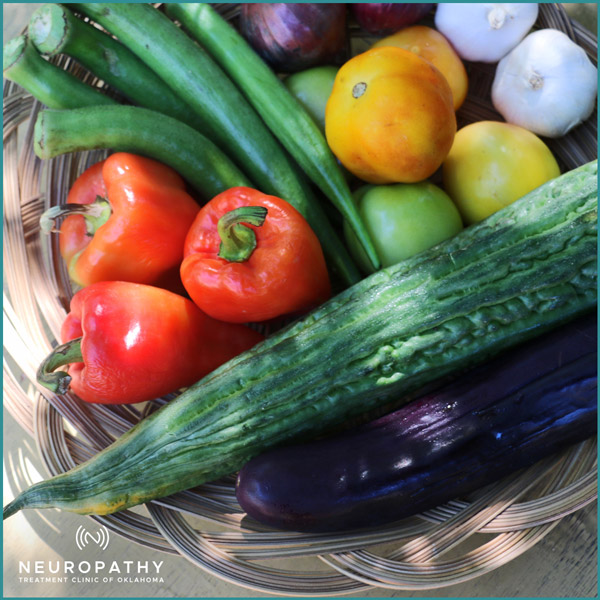A plant-based diet has astounding benefits that are astronomical to your health.
For years people have been told to eat lots of meat and dairy, but there are many ways that a plant-based diet can benefit you that meat and dairy cannot. Since we are located in the Midwest, we have ranchers, farmers, and others with similar lifestyles who visit the Neuropathy Treatment Clinic of Oklahoma. These people are now in their ’70s and ’80s and have been eating primarily meat and potatoes their whole life, leading to significant health concerns. I tell my patients that it’s better to switch to a mostly plant-based diet while still eating meat two or three times a week than to remain primarily eating meat and dairy. It isn’t easy to eliminate meat and dairy altogether, but reducing your intake and eating more plants can greatly benefit your health.
The Benefits
The most significant benefits of having a plant-based diet are a reduced risk of cancer and diabetes. Your blood pressure is also going to get better, and you will lose weight because the focus of the diet is eating fresh fruits, fresh vegetables, whole grains, and things that are grown and are not processed. As you get older, there’s reduced inflammation and, of course, lowered cholesterol levels because we get cholesterol from animal products like meat and dairy. If you don’t have any meat and dairy in your diet, your cholesterol will be normal.
There are many benefits for people with diabetes. In fact, I tell my patients that it is the only way you can reverse type two diabetes. We can’t do that with medication or surgery, but we can do it with diet. If you want to get off insulin or Metformin, that’s the first thing that I suggest because it has been shown to reverse diabetes in many people. A plant-based diet will also help with high blood pressure.
How to implement a plant-based diet
It’s important to limit anything that’s not grown from the ground or naturally made in nature. This diet includes whole grains, fruits, vegetables, spices, and potatoes, but no added oils. To avoid sugar, some people won’t eat fruit because it contains sugar. That may be true, but it’s a different type of sugar. It’s not the refined white processed sugar that you want to avoid, but it’s natural. Your body still needs glucose for energy, so cutting out sugar entirely is unhealthy. Your goal is to eliminate or limit your processed foods, meaning anything out of a can or out of a box.
Unfortunately, our society tends to glorify these fad diets where you eliminate this whole food group, such as grains. In a plant-based diet, your body will get everything it needs as long as you’re eating a balanced diet, meaning all different colors of fruits and vegetables because they all offer a variety of properties that your body needs with various vitamins and antioxidants. If you’re eating that way, you’re going to get everything that you need without having to eliminate all of that other stuff. Instead of viewing this as a restrictive diet, you want to implement it as a lifestyle change to fuel your body and make you healthier in the present and the future.
Another concern that I often receive is patients asking how to get enough protein on a plant-based diet. The primary way is to eat plenty of beans and nuts in your diet, which is easily incorporated. An easy meal for lunch that will give you a protein boost is a bowl with brown rice, black or pinto beans, and vegetables. Snacking on nuts is also a great way to get an appropriate amount of protein. Almonds are the best source of protein, and you can also use almond butter to incorporate almonds more easily into your diet. Nevertheless, there are lots of different options and safe ways to add nuts into your plant-based diet.
Risks for a plant-based diet
Many people ask if there are risks to implementing a plant-based diet, and the only thing I would recommend is to take a B-12 supplement if you’re not already taking one. With a plant-based diet, we’re all at risk for deficiencies just because we, as humans, used to receive B-12 from the dirt on our fruit and things that were in our water. Now that our food is clean when we buy it or clean it ourselves, the B-12 is washed away, leaving us with a risk for deficiencies that can cause fatigue and nerve problems.
Prevent the symptoms of Neuropathy
If you’re experiencing symptoms like burning, tingling, numbness, or loss of touch, you might have neuropathy. Neuropathy results from inflammation a lot of the time and is usually a symptom of something else going wrong in your body, such as diabetes or kidney disease. Implementing a plant-based diet will help your body overcome these diseases and decrease your chance of getting neuropathy or help you recover from it. If you’re experiencing symptoms of neuropathy, we can help! To learn more or to book a consultation, call 918.921.8160.


